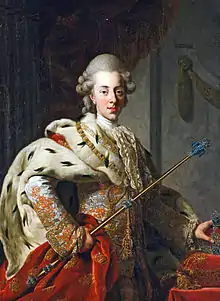Christian VII of Denmark
Christian VII of Denmark (29 January 1749 – 13 March 1808) was the King of Denmark and Norway from 1766 to 1808, and the duke of Schleswig and Holstein. He was the son of King Frederick V of Denmark and Louise of Great Britain.
| Christian VII | |
|---|---|
 | |
| King of Denmark and Norway (more...) | |
| Reign | 14 January 1766 – 13 March 1808 |
| Coronation | 1 May 1767 Christiansborg Palace Chapel |
| Predecessor | Frederick V |
| Successor | Frederick VI |
| Born | 29 January 1749 Christiansborg Palace, Copenhagen, Denmark |
| Died | 13 March 1808 (aged 59) Rendsburg, Duchy of Holstein |
| Burial | Roskilde Cathedral |
| Spouse | Caroline Matilda of Great Britain (m. 1766; div. 1772) |
| Issue | Frederick VI of Denmark Louise Auguste, Duchess of Schleswig-Holstein-Sonderburg-Augustenburg |
| House | Oldenburg |
| Father | Frederick V of Denmark |
| Mother | Louise of Great Britain |
| Religion | Lutheran |
Early life
He lost his mother at the age of three. His stepmother, Juliana Maria of Brunswick-Wolfenbüttel, did not take an interest in him, and preferred her own son, Frederik. Christian suffered from epileptic seizures. His educator, Count Detlev of Reventlow, educated him very severely, locking him up in dark chambers for hours at times. Starting at an early age, Christian showed signs of mental illness. At age 17, he was married to his cousin, Caroline Matilda of Great Britain. Caroline Matilde bore a son, the future King Frederick VI of Denmark.
Court life
When he became king, his cabinet ruled, much like in his father's time. The cabinet was led by Count Johann Hartwig Ernst von Bernstorff. When he toured Europe, he met Johann Friedrich Struensee, a medical doctor, who was influenced by the ideas of Enlightenment. Struensee soon gained influence at the court. Struensee initiated a number of liberal reforms. He also became the lover of queen Louise, who Christan neglected. In the year 1771, Princess Louise Auguste of Denmark was born. People think that Struensee was probably her father. Struensee was executed on 28 April 1772 outside the gates of Copenhagen. The queen was banned from the court. One of the last decrees of Struensee was to create the town of Christiansfeld, where people from the Moravian Church found shelter.
After the execution, Ove Høegh-Guldberg led the kingdom, supported by Queen Juliane and her son. Many of Struensee's reforms were undone. Andreas Peter Bernstorff stepped down in 1780. In the year 1784, Christian's son Frederick took power, reigning in the place of his father. Frederick was influenced by Enligtenment, and made a number of reforms; for example, the abolition of serfdom. Ernst Heinrich von Schimmelmann was made minister of finances. Together with Christian Ditlev Reventlow they boosted trade. Von Bernstorff returned to power in 1784, and was a strong supporter of the neutrality of Denmark. There was an economic boom.
Death
Christian VII died on march 13 1808 as a result of a stroke.